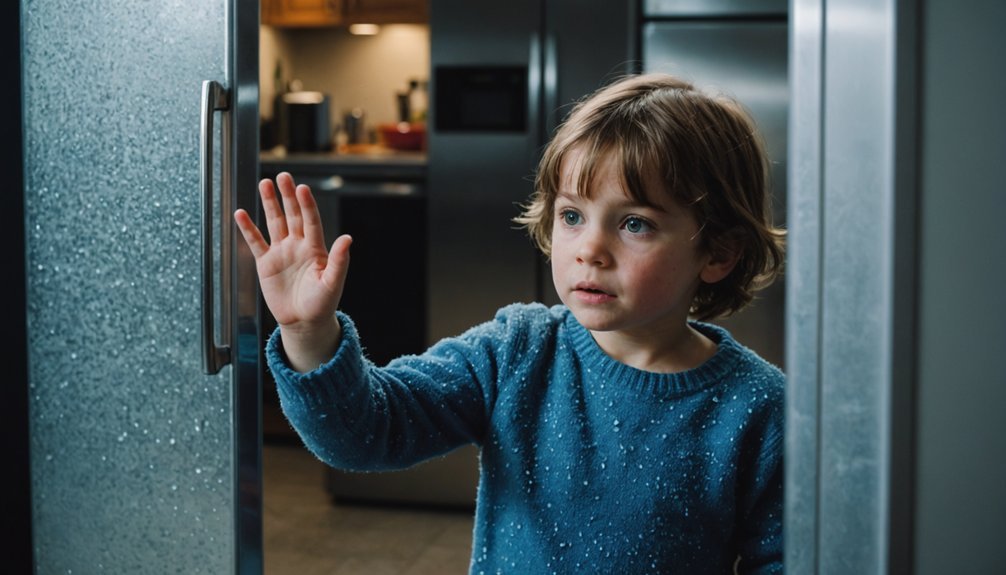You've probably heard the term "cold shoulder," but have you considered whether you're giving your children the emotional equivalent of a deep freeze? While you're managing your daily responsibilities and meeting your family's physical needs, you might be unknowingly creating an invisible barrier between yourself and your kids. This emotional distance, known as refrigerator parenting, can leave lasting imprints on your children's development and shape how they form relationships throughout their lives. If you're wondering whether you've fallen into this pattern – or if you're ready to thaw out the emotional frost – there's hope for warming up your parent-child connection.
Key Takeaways
- Refrigerator parenting involves emotional coldness and minimal affection, creating long-lasting developmental challenges in children's ability to form secure attachments.
- Children experiencing emotional freezing may show withdrawal, excessive people-pleasing behavior, and difficulty maintaining eye contact during interactions.
- Warning signs include minimal physical affection, lack of emotional engagement, and limited responsiveness to your child's emotional needs.
- Building emotional connection requires consistent gentle interactions, maintaining eye contact, and showing genuine interest in your child's daily activities.
- Regular emotional validation, warm responses, and creation of safe spaces for expression help prevent or heal emotional freezing effects.
Understanding Refrigerator Parenting
Coldness and emotional distance characterize refrigerator parenting, a term coined in the 1940s to describe a parenting style marked by minimal physical affection and emotional engagement.
If you're wondering whether you might be a refrigerator parent, you'll notice patterns of detachment in your interactions with your children, including limited eye contact, infrequent physical touch, and difficulty expressing warmth or empathy.
Your emotional availability plays an essential role in your child's development. When you maintain a consistently cold demeanor, you're creating an environment where your child may struggle to form secure attachments and develop healthy emotional regulation skills.
Children need nurturing interactions to thrive, including regular positive feedback, loving gestures, and genuine interest in their experiences.
You'll recognize refrigerator parenting through specific behaviors: responding to your child's emotional needs with logic rather than empathy, avoiding physical displays of affection, and maintaining rigid boundaries that prevent emotional intimacy.
While structure and discipline are important, they shouldn't come at the expense of creating a warm, supportive environment where your child feels truly seen and valued.
Signs Your Child Feels Disconnected

Emotional withdrawal often manifests in children who feel disconnected from their parents. As you navigate your relationship with your child, it's essential to recognize the emotional cues that signal connection barriers between you. Your child's behaviors and reactions can provide valuable insight into their emotional well-being and sense of security within your relationship.
Watch for these warning signs that your child may be experiencing emotional disconnection:
- They've stopped sharing their daily experiences or seeking your advice, preferring to withdraw into their own world.
- They display excessive people-pleasing behavior, constantly trying to earn your approval or attention.
- They struggle to maintain eye contact or physical proximity during interactions with you.
- They respond with flat affect or minimal emotion when you attempt to engage with them.
- They exhibit heightened anxiety or defensive reactions when you approach them.
Understanding these signs doesn't mean you're a bad parent – it means you're taking the first step toward healing your relationship. By recognizing these patterns early, you can work on rebuilding trust and strengthening your emotional bond through consistent, empathetic responses to your child's needs.
Breaking The Ice With Kids

Starting with small gestures like a gentle smile or showing interest in your child's daily activities can help thaw emotional distance.
You'll find that trust develops gradually as you create more opportunities for open dialogue and shared experiences.
Building warmer connections requires patience and consistency, allowing your child to feel safe enough to respond at their own pace.
Warm Communication Starts Small
Breaking through communication barriers with emotionally distant children requires patience and small, deliberate steps. Daily check-ins and small gestures can gradually thaw the frost between you and your child, creating opportunities for deeper connection.
Start with brief, non-threatening interactions that don't demand lengthy responses or emotional vulnerability. Your consistent, gentle approach will help your child feel safe opening up at their own pace.
Consider these warming strategies that nurture emotional safety:
- Smile and make eye contact when your child enters the room
- Leave encouraging sticky notes on their bedroom door
- Send simple text messages showing you're thinking of them
- Ask specific questions about their interests rather than generic "How was your day?"
- Share brief stories about your own daily experiences to model openness
Remember that emotional reconnection isn't about grand gestures or forced conversations. It's about creating a pattern of reliable, judgment-free moments that demonstrate your availability and care.
When you notice your child responding positively to these small interactions, resist the urge to push for more. Let them set the pace as trust rebuilds naturally through these consistent touchpoints.
Building Trust Takes Time
Trust with emotionally distant children doesn't thaw overnight – it melts gradually through consistent, authentic interactions. When you're working to overcome a pattern of emotional distance, remember that trust development follows its own timeline. Your child needs to see and experience your emotional availability repeatedly before feeling secure enough to open up.
Start by being present and responsive during daily moments, even if your child seems indifferent. Notice when they share small details about their day or show interest in yours. Respond with genuine curiosity and warmth, but don't force deeper conversations. Let them set the pace for emotional sharing.
You might feel discouraged when your attempts at connection aren't immediately reciprocated. That's normal, but don't let it derail your efforts. Each positive interaction builds upon the last, creating a foundation for trust.
Pay attention to subtle changes – a longer conversation here, an unprompted share there. These are signs that your child is beginning to feel emotionally safer with you. Keep showing up consistently, and you'll gradually see the protective walls between you and your child begin to dissolve.
Rebuilding Trust and Connection

Building trust with your emotionally distant child requires consistent, incremental actions that demonstrate your commitment to change.
You'll need to establish new patterns of interaction through small but meaningful gestures, like leaving encouraging notes or setting aside dedicated one-on-one time each day.
When your child opens up, practice active listening without judgment, maintaining a welcoming presence that shows you're fully present and receptive to their thoughts and feelings.
Small Steps Build Bridges
Repairing relationships affected by refrigerator parenting takes patience and consistent effort from both parent and child. Through small gestures and gradual engagement, you can begin rebuilding emotional connections that may have grown cold over time.
Start by creating opportunities for meaningful interaction, even if they're brief. Your consistent presence and genuine interest show your child that you're committed to positive change. Remember that healing happens in small moments – a smile across the breakfast table, a gentle touch on the shoulder, or simply sitting together quietly.
- When your child speaks, put down your phone and make eye contact
- Share one genuine compliment or observation about their day
- Spend 10 minutes of uninterrupted time together doing something they choose
- Express interest in their thoughts and feelings without judgment
- Acknowledge past emotional distance and validate their experiences
As you practice these connecting behaviors, be patient with the process. Your child may need time to trust that these changes are permanent.
Keep showing up, stay consistent with your efforts, and celebrate small victories as your relationship gradually warms. Each positive interaction builds a stronger foundation for emotional intimacy and trust.
Listen With Open Arms
Over time, genuine listening becomes the cornerstone of reconnecting with a child who's experienced refrigerator parenting. When you practice active listening, you're demonstrating that your child's thoughts and feelings matter, helping to thaw the emotional distance that's developed between you.
Create a safe space where your child can express themselves without fear of judgment or dismissal. This means putting away your phone, maintaining eye contact, and offering empathetic responses that validate their experiences. You might say, "I hear how difficult that was for you" or "It makes sense that you felt that way."
Don't rush to solve their problems or minimize their feelings. Instead, focus on understanding their perspective, even if it's uncomfortable to hear how your past emotional unavailability has affected them. When your child shares difficult emotions, resist the urge to become defensive. Your role is to listen and acknowledge, showing them that you're committed to changing the pattern of emotional distance.
Remember that consistency in your listening approach builds trust gradually. Each conversation where you remain present and receptive helps repair the emotional bond between you and your child.
Creating Emotional Safety

The path toward emotional safety begins with consistent, warm responses to a child's needs.
Creating safe spaces where your children feel heard and understood requires intentional emotional validation of their experiences, even when their reactions seem disproportionate to the situation.
When children feel emotionally safe, they're more likely to:
- Trust you with their deepest fears and insecurities
- Develop healthy self-regulation skills
- Express their authentic emotions without fear of judgment
- Form secure attachments in future relationships
- Navigate life's challenges with resilience
You'll need to examine your own emotional responses and triggers to maintain this environment of safety.
If you find yourself becoming dismissive or cold when your child expresses strong emotions, pause and reflect on what's causing your reaction.
Remember that emotional safety isn't about perfection – it's about repair and consistency.
Watch for signs that your child feels emotionally secure: they seek you out when upset, share their thoughts freely, and demonstrate age-appropriate emotional expression.
When children know their feelings matter to you, they develop the confidence to process and manage their emotional experiences effectively.
Maintaining Meaningful Parent-Child Bonds

Building meaningful parent-child bonds naturally flows from a foundation of emotional safety, yet requires ongoing attention and nurturing throughout your child's development. When you make yourself emotionally available and demonstrate unconditional love, you're creating lasting connections that shape your child's future relationships and self-worth.
Quality time doesn't always mean grand gestures – it's about being present in everyday moments. Create opportunities for shared activities that align with your child's interests, whether it's cooking together, reading stories, or exploring nature. Active engagement in their world shows you value their experiences and perspectives.
Establish a supportive environment by maintaining family traditions that provide consistency and belonging. These shared experiences become anchors of connection that your child can rely on, especially during challenging times. Remember to offer positive reinforcement not just for achievements, but for their efforts and character traits.
You'll strengthen your bond when you put away distractions, maintain eye contact during conversations, and show genuine interest in their thoughts and feelings. It's these small, consistent actions that build trust and create the emotional scaffold your child needs to thrive.
Frequently Asked Questions
Can Refrigerator Parenting Be Genetic or Passed Down Through Generations?
While emotional distancing isn't directly genetic, you'll find that parenting styles often follow inheritance patterns across generations.
If you grew up with emotionally distant caregivers, you might unconsciously adopt similar behaviors with your own children.
This emotional legacy can shape how you connect with others, but it's not your destiny.
You can break this cycle through self-awareness, therapy, and conscious efforts to build warmer, more nurturing relationships with your children.
At What Age Do Children Become Most Affected by Emotional Detachment?
Children are most vulnerable to emotional detachment during their early developmental years, particularly from birth to age 5.
During this critical period, you'll notice that your child's emotional development and attachment patterns are being strongly shaped.
If you experience difficulties connecting with your child, it's important to know that childhood trauma from emotional detachment can affect them throughout their lives, but support and intervention at any age can help heal these wounds.
How Does Refrigerator Parenting Differ Between Mothers and Fathers?
Just as you might notice different temperatures between two freezers, you'll find distinct patterns in motherly differences and fatherly approaches to emotional distance.
Mothers typically withdraw through reduced physical affection and limited verbal communication, while fathers often create distance through work-focused behavior and reduced family time.
You're not alone in observing these variations – research shows mothers tend to maintain basic caregiving despite detachment, while fathers might completely disconnect from daily family interactions.
Can Therapy Alone Fix the Damage Caused by Refrigerator Parenting?
While therapy can be a powerful tool in your emotional healing journey, it shouldn't be viewed as a standalone solution.
You'll likely need a combination of therapeutic interventions, including individual counseling, family therapy, and possibly support groups.
Remember, healing from emotional neglect is a process that often requires building a network of support, developing new relationship skills, and practicing self-compassion.
The path to recovery typically involves multiple approaches working together.
Does Refrigerator Parenting Affect Boys and Girls Differently?
While both boys and girls experience lasting emotional impact from emotionally distant parenting, you'll find that gender differences can shape their responses.
Girls often internalize the emotional neglect, leading to anxiety and relationship difficulties, while boys may externalize through aggressive behaviors or emotional detachment.
You're not alone in noticing these patterns – research shows that your child's gender can influence how they process and express their emotional needs throughout development.
Conclusion
By thawing the emotional frost between you and your child, you're creating space for warmth and connection to bloom. Like a spring garden emerging from winter's grip, your relationship can flourish with consistent nurturing. You'll see your child's emotional walls melt away as you cultivate trust through patience and genuine engagement. Remember, it's never too late to transform a cold parenting climate into one of lasting emotional warmth.





0 responses to “Refrigerator Parenting: Are You Emotionally Freezing Out Your Kids?”
Interesting read! But, isnt it possible that some kids might actually thrive under refrigerator parenting due to their independent nature?
Isnt Refrigerator Parenting just another label for emotional neglect? Why not focus on building emotional intelligence instead?